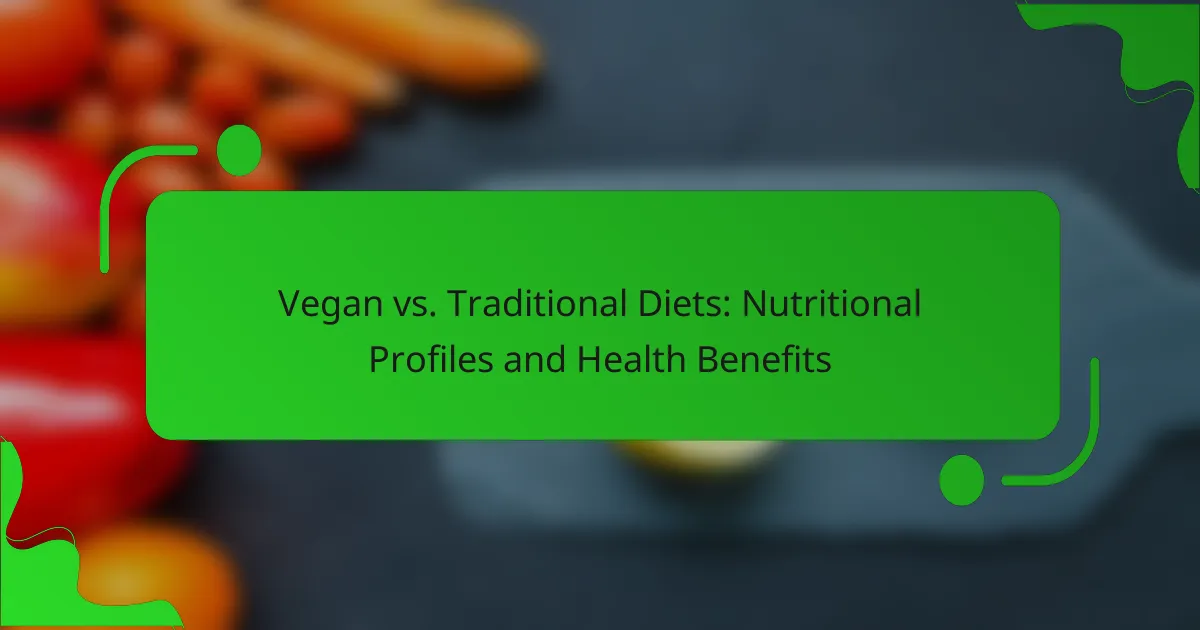The debate between vegan and traditional diets centers on their distinct nutritional profiles and associated health benefits. Vegan diets, rich in plant-based foods, can enhance overall wellness and reduce disease risk, while traditional diets provide essential nutrients and protein from animal sources. Understanding these differences is crucial for making informed dietary choices that align with personal health goals.

What are the health benefits of a vegan diet in Los Angeles?
A vegan diet offers several health benefits, particularly in a health-conscious city like Los Angeles. Many individuals experience improvements in overall wellness, reduced disease risk, and enhanced nutrient intake by adopting a plant-based lifestyle.
Lower risk of chronic diseases
Adopting a vegan diet can significantly lower the risk of chronic diseases such as heart disease, diabetes, and certain cancers. This is largely due to the high intake of fruits, vegetables, whole grains, and legumes, which are rich in antioxidants and fiber.
Studies suggest that vegans may have lower cholesterol levels and blood pressure, contributing to better cardiovascular health. In Los Angeles, where health trends are prevalent, many find that plant-based diets align with their wellness goals.
Improved digestive health
A vegan diet is typically high in dietary fiber, which promotes healthy digestion and regular bowel movements. Foods like beans, lentils, and whole grains are excellent sources of fiber that can help prevent constipation and support gut health.
Moreover, a diverse range of plant foods can foster a healthy microbiome, which is crucial for overall digestive function. In a city like Los Angeles, where many prioritize gut health, a vegan diet can be a beneficial choice.
Weight management advantages
Many individuals find it easier to manage their weight on a vegan diet due to lower calorie density in plant-based foods. Fruits, vegetables, and whole grains provide essential nutrients while often being lower in calories compared to animal products.
In Los Angeles, where fitness and body image are significant, many people turn to veganism as a strategy for weight loss or maintenance. Incorporating a variety of plant-based meals can help individuals feel satiated while managing their caloric intake.
Enhanced nutrient intake
A well-planned vegan diet can lead to higher intakes of essential vitamins and minerals, such as vitamin C, potassium, and magnesium. Plant-based foods are often rich in these nutrients, which are vital for maintaining good health.
However, it’s important for vegans to ensure they are getting enough vitamin B12, iron, and omega-3 fatty acids, which may require fortified foods or supplements. In Los Angeles, many health stores offer a variety of vegan supplements to help meet these nutritional needs.
Environmental impact reduction
Choosing a vegan diet can significantly reduce one’s environmental footprint. Plant-based diets generally require fewer natural resources and produce lower greenhouse gas emissions compared to traditional meat-based diets.
In Los Angeles, where environmental sustainability is a growing concern, many individuals adopt veganism not only for health benefits but also to contribute to a more sustainable food system. Supporting local vegan restaurants and markets can further enhance this positive impact.

What are the health benefits of a traditional diet in Los Angeles?
A traditional diet in Los Angeles offers numerous health benefits, including a rich source of protein, essential nutrients, and a diverse range of food options. These aspects contribute to balanced meals that support overall health while promoting local agriculture.
Higher protein sources
Traditional diets often include a variety of protein-rich foods such as lean meats, fish, dairy, and legumes. In Los Angeles, access to fresh seafood and high-quality meats can enhance protein intake, which is essential for muscle repair and overall bodily function.
Incorporating sources like chicken, fish, and plant-based proteins can help meet daily protein requirements, typically ranging from 46 grams for women to 56 grams for men. Choosing local options can also ensure freshness and better nutrient retention.
Inclusion of essential nutrients
A traditional diet emphasizes whole foods that are packed with essential nutrients, including vitamins, minerals, and healthy fats. Foods like leafy greens, nuts, and dairy products provide vital nutrients such as calcium, vitamin D, and omega-3 fatty acids.
In Los Angeles, the availability of fresh produce year-round allows for a diet rich in antioxidants and fiber, which are crucial for maintaining a healthy immune system and digestive health.
Variety of food options
One of the key benefits of a traditional diet is the variety of food options available. This diversity not only makes meals more enjoyable but also ensures a broader spectrum of nutrients. Traditional meals can include a mix of grains, proteins, vegetables, and fruits.
In Los Angeles, cultural influences contribute to a wide array of traditional dishes, allowing residents to explore different cuisines while still adhering to healthful eating patterns. This variety can help prevent dietary boredom and promote adherence to healthy eating habits.
Potential for balanced meals
Traditional diets can facilitate the creation of balanced meals that include appropriate portions of macronutrients: proteins, carbohydrates, and fats. By focusing on whole foods, individuals can easily assemble meals that meet their nutritional needs.
For example, a balanced meal might consist of grilled chicken, quinoa, and a side of roasted vegetables, providing a satisfying combination of flavors and nutrients. This approach can help maintain energy levels and support overall health.
Support for local agriculture
Choosing a traditional diet often means supporting local agriculture, which can have a positive impact on community health and the environment. By purchasing locally sourced foods, individuals contribute to the economy and reduce their carbon footprint.
In Los Angeles, farmers’ markets and local farms provide fresh produce and meats, allowing residents to enjoy seasonal foods while fostering sustainable practices. This connection to local agriculture can enhance the quality of food consumed and promote a sense of community.

How do vegan and traditional diets compare nutritionally?
Vegan and traditional diets differ significantly in their nutritional profiles, impacting overall health and wellness. While traditional diets often include animal products, vegan diets focus on plant-based foods, leading to variations in protein, vitamins, minerals, and other nutrients.
Protein content differences
Protein sources vary greatly between vegan and traditional diets. Traditional diets typically include meat, dairy, and eggs, which are complete proteins containing all essential amino acids. In contrast, vegan diets rely on plant-based proteins such as legumes, nuts, and grains, which may require combining different sources to achieve a complete amino acid profile.
For vegans, incorporating a variety of protein sources can help meet daily requirements, which generally range from 46 grams for women to 56 grams for men. Foods like quinoa, soy products, and lentils are excellent options to boost protein intake.
Vitamin and mineral availability
Vegan diets can lack certain vitamins and minerals commonly found in animal products, particularly vitamin B12, iron, and calcium. Vitamin B12 is crucial for nerve function and is primarily found in animal-derived foods, making supplementation necessary for those on a vegan diet.
Iron is present in both diets, but the heme iron from meat is more easily absorbed than the non-heme iron from plants. Vegans should consume vitamin C-rich foods alongside iron sources to enhance absorption. Calcium can be obtained from fortified plant milks and leafy greens, but traditional diets often provide it through dairy products.
Caloric intake variations
Caloric intake can differ between vegan and traditional diets due to the types of foods consumed. Traditional diets may be higher in calories due to the inclusion of fatty meats and dairy, while vegan diets often consist of lower-calorie, high-fiber foods like fruits and vegetables.
Vegans should be mindful of their caloric intake to ensure they meet energy needs, especially if they consume fewer calorie-dense foods. Tracking food intake can help maintain a balanced diet while ensuring sufficient energy levels.
Fiber levels comparison
Fiber content is typically higher in vegan diets, as plant-based foods are rich in dietary fiber. This can lead to improved digestive health and a lower risk of chronic diseases. Traditional diets, particularly those high in processed foods, may lack sufficient fiber.
Vegans can benefit from a variety of fiber sources, including whole grains, fruits, vegetables, and legumes. Aim for at least 25 grams of fiber per day for women and 38 grams for men, which can be easily achieved through a well-planned vegan diet.
Fat composition analysis
The fat composition in vegan and traditional diets varies significantly. Traditional diets often include saturated fats from animal products, which can contribute to heart disease if consumed in excess. In contrast, vegan diets tend to be lower in saturated fats and higher in unsaturated fats from sources like avocados, nuts, and seeds.
Choosing healthy fats is essential for both diets. Vegans should focus on incorporating sources of omega-3 fatty acids, such as flaxseeds and chia seeds, to support heart health. Monitoring fat intake can help maintain a balanced diet and promote overall wellness.

What factors should be considered when choosing between vegan and traditional diets?
Choosing between vegan and traditional diets involves evaluating personal health goals, ethical beliefs, food accessibility, cost, and cooking skills. Each factor plays a crucial role in determining which diet aligns best with individual needs and lifestyle preferences.
Personal health goals
Your personal health goals significantly influence the choice between vegan and traditional diets. For instance, if weight loss or heart health is a priority, a vegan diet rich in fruits, vegetables, and whole grains may be beneficial. Conversely, if muscle gain or specific nutrient intake is a focus, a traditional diet that includes lean meats and dairy might be more suitable.
Consider consulting with a healthcare professional or nutritionist to tailor your diet according to your health objectives, ensuring you meet your nutritional needs effectively.
Ethical considerations
Ethical beliefs often drive the decision to adopt a vegan diet. Many choose veganism to avoid animal suffering and reduce their environmental impact. Traditional diets, while they can include ethical sourcing, may not align with these values if they involve factory-farmed animal products.
Reflecting on your ethical stance can help clarify your dietary choices and motivate adherence to a particular lifestyle, whether it be vegan or traditional.
Food accessibility in Los Angeles
Food accessibility is a critical factor in Los Angeles, where both vegan and traditional options are widely available. Vegan products, including plant-based proteins and dairy alternatives, can be found in many grocery stores and specialty markets. Traditional ingredients, such as meats and dairy, are equally accessible.
However, consider the availability of fresh produce and local markets, as these can enhance the quality of a vegan diet. Exploring local farmers’ markets can provide fresh, organic options that support both diets.
Cost implications
The cost of adopting a vegan versus a traditional diet can vary significantly. Vegan diets can be economical if based on whole foods like grains, beans, and seasonal vegetables. However, specialty vegan products can increase expenses.
Traditional diets may incur higher costs depending on the quality of meat and dairy purchased. Budgeting for your preferred diet involves assessing local prices and planning meals to minimize waste and maximize nutrition.
Cooking skills and preferences
Your cooking skills and preferences play a vital role in the success of either diet. A vegan diet may require learning new recipes and cooking techniques, especially for those unfamiliar with plant-based cooking. Embracing this learning curve can lead to enjoyable culinary experiences.
On the other hand, if you prefer traditional cooking methods and recipes, a traditional diet may be easier to maintain. Consider your willingness to experiment with new ingredients and cooking styles when making your choice.



